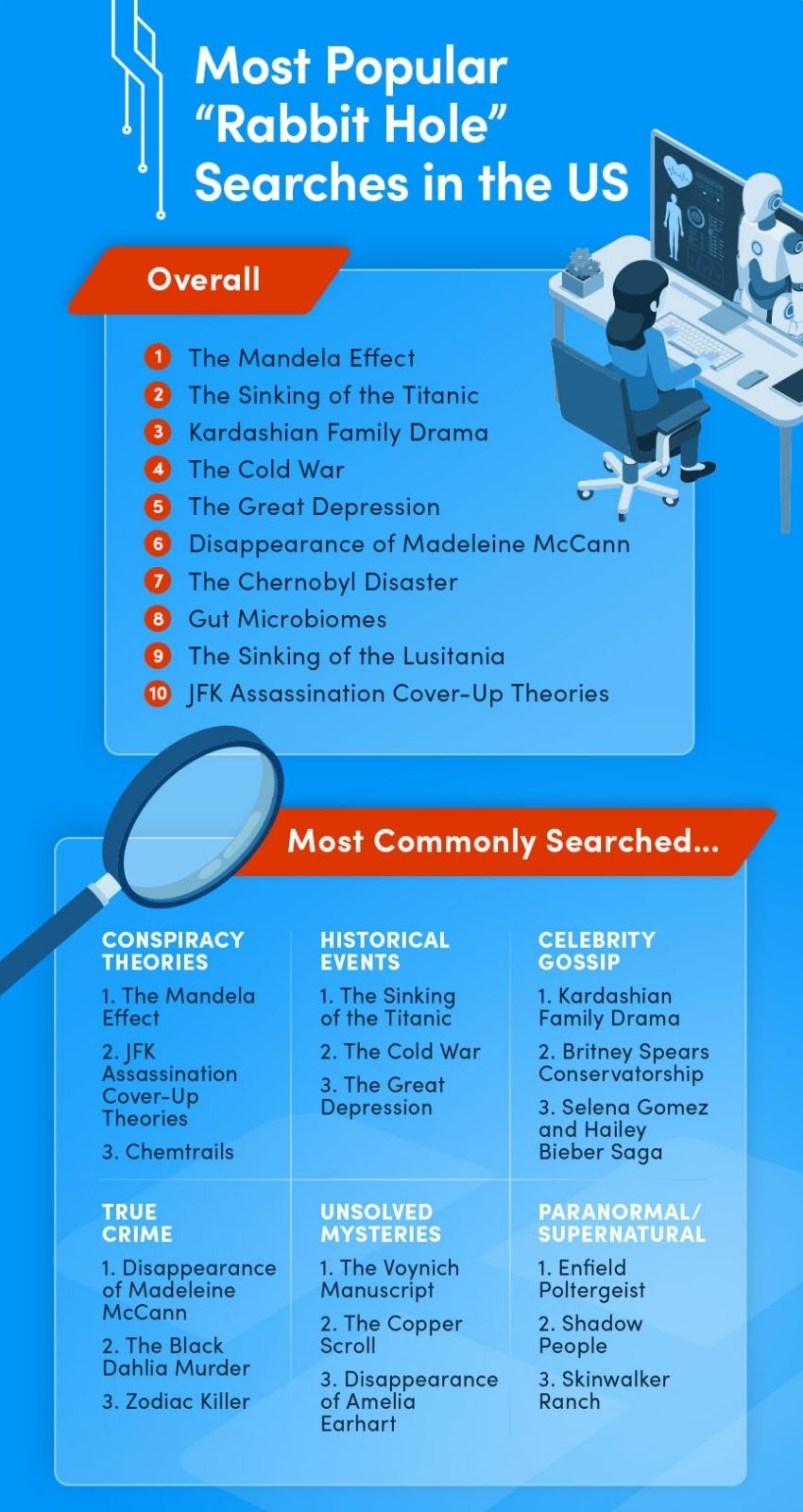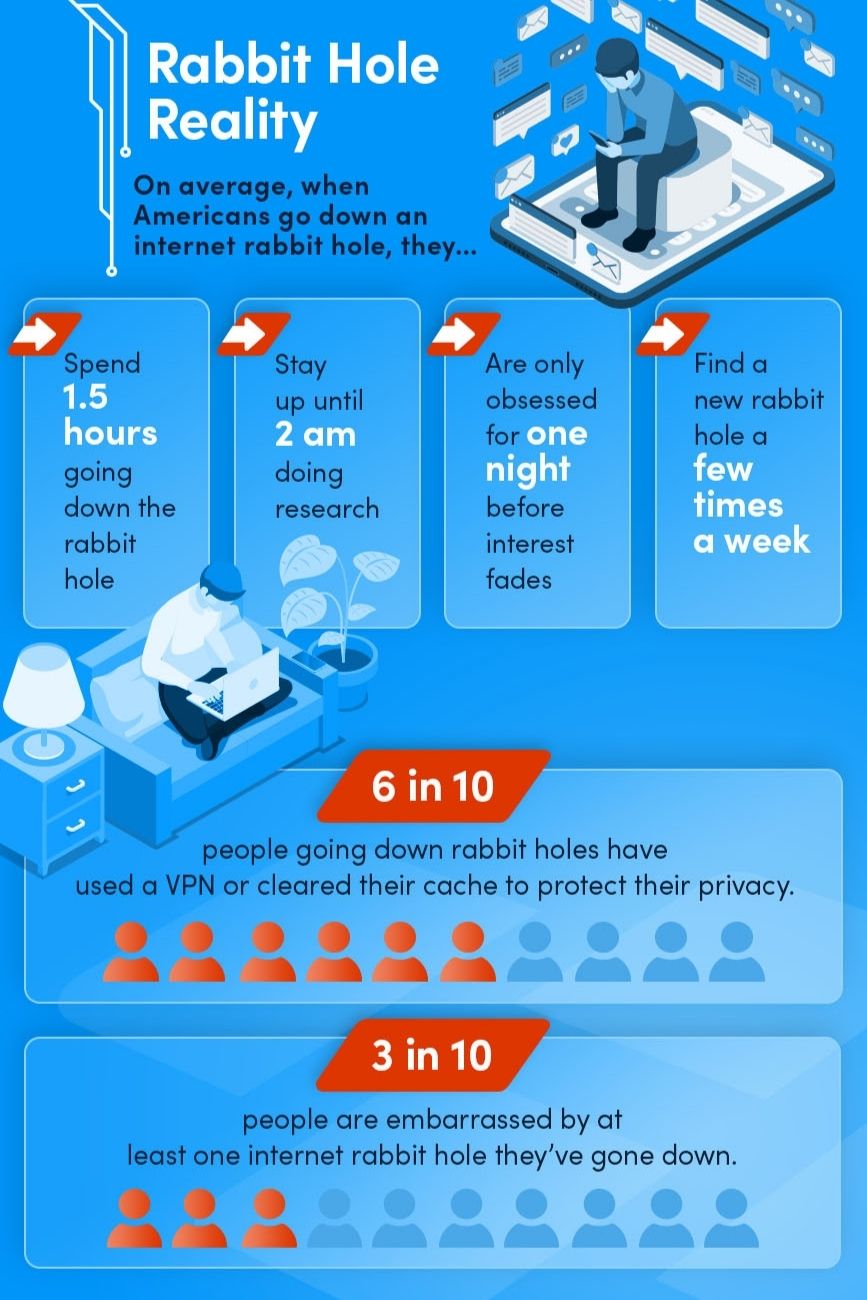
Falling Down the Rabbit Hole
Americans are online—a lot. According to a 2025 survey, the average American spends over 10 hours a day online — about 5 hours watching videos and another 5.4 hours browsing, shopping, paying bills, playing games, or chatting.
But we’re not just aimlessly scrolling. Much of that time is spent diving deep into topics that catch our attention, down what the internet lovingly calls “rabbit holes.”
A rabbit hole can start innocently enough: a single search, a random YouTube video, or a social media post that grabs your curiosity. One click leads to another, and suddenly you’re immersed, watching related videos, reading threads, exploring tangents. Each new link feeds your curiosity just enough to keep you going.
And before long, you’ve traveled far from where you began. You might start with a video of a chef slicing sushi, which leads to Japanese cuisine, then Japanese culture, then global cultural differences — and somehow, you end up learning about Neolithic stone tools. The journey is unpredictable, but that’s exactly what makes it so addictive.
Americans, as it turns out, love a good internet rabbit hole, with some states favoring specific topics over others. To find out more, Hughesnet® analyzed Google Trends data across 62 topics, including true crime, the paranormal, celebrity gossip, history, mysteries, and conspiracies. We then surveyed 500 internet users to uncover state-specific rabbit hole preferences….which we just realized was the result of our own dive down an internet rabbit hole.
Anyway, here’s what we found!
America’s Top Rabbit Hole Internet Searches
We discovered that Americans share an enduring fascination with ten rabbit hole–worthy topics that span history, pop culture, science, and mystery.
Leading the way is the Mandela Effect, a phenomenon that continues to baffle and unite curious minds across the internet. Close behind are historical tragedies like the sinking of the Titanic and the Lusitania, as well as the enduring intrigue surrounding the Chernobyl disaster and the Cold War.
True crime and unsolved mysteries continue to capture attention, with disappearances and conspiracy theories ranking among the most-searched topics. On the lighter side, Kardashian family drama keeps millions entertained, while scientific curiosities like gut microbiomes prove that even health and biology can pull people deep into the digital abyss. Rounding out the list is the Great Depression, a topic that continues to fascinate Americans seeking to understand economic history and its lasting impact.
Here are the top searches we found:

The Rabbit Hole Searches Captivating Every State
Looking at the data, some interesting trends appeared. The South seems to have a fascination with maritime disasters, with the most common rabbit holes searched centering on the sinking of the Lusitania and the Titanic (nationally, the Titanic edges ahead of the Lusitania: 11 states are obsessed with the Titanic, compared to 10 for the Lusitania).
Conspiracy theories are prime candidates for rabbit hole searches, and the data supports this. Chemtrails, the Mandela Effect, and JFK assassination theories were well represented in the survey, with UFOs, HAARP weather control, and 9/11 inside job theories all claiming their piece of the pie. Surprisingly, Elvis is Alive theories remain popular, with Alabama, Arkansas, Indiana, Kentucky, Mississippi, Nebraska, Ohio, and Tennessee all trying to determine if the King of Rock and Roll faked his own death.
California, unsurprisingly, has a love of Kardashian family drama, an interest shared by Delaware and Hawaii. Perhaps most surprisingly, we have a national fascination with gut microbiomes — states as diverse as Connecticut, Florida, Maryland, Massachusetts, New York, Oregon, and Vermont ranked gut microbiomes as their most popular rabbit hole.
Less surprisingly, the national obsession with true crime remains strong, with all 50 states showing continued fascination with unsolved murders, missing persons cases, and infamous criminal mysteries.
How Curiosity Varies Across the Country
Every state has its own way of getting lost online. When we looked at the total search popularity across all rabbit hole searches, distinct patterns emerged.
In some places, like Utah, Missouri, and Massachusetts, people seem especially tuned in — searching across a wide range of rabbit hole topics. Meanwhile, Delaware, Hawaii, and South Dakota kept things a little lighter, with fewer deep dives overall.
Surveying Internet Users on Rabbit Hole Intrigue
Survey respondents confirmed what we already suspected: internet rabbit hole costs time. Two-thirds of those surveyed reported staying up past 2:00 am to research topics online, and a third admitted to pulling all-nighters to get to the bottom of a rabbit hole. People also admitted to skipping chores during online deep dives.
Privacy concerns are also common. 60% of respondents reported protecting their privacy by using VPNs, clearing search cache after browsing, or setting their browsers to private mode.
As for where rabbit holes start, YouTube, Reddit, and TikTok are reported as the most common sources, followed by Wikipedia, Instagram, and X. Almost 25% of respondents cited forums and message boards as jumping-off points. Less than 21% reported news sites as the origin points for their rabbit hole searches, suggesting traditional media has a limited impact on search habits.

Staying Connected Through Every Rabbit Hole
Late-night searches and endless rabbit holes require a strong, steady internet connection. Hughesnet’s satellite internet service provides you with the reliability and speed needed to find out how far the rabbit hole goes, no matter when you get the urge to dive into a topic. We’ll help you stay connected during your research, whether you're on the hunt for D.B. Cooper or exploring the Titanic tragedy.
Methodology
To identify the most popular “rabbit holes” across the United States, we analyzed 62 different topics spanning true crime cases, conspiracy theories, medical diagnoses and symptoms, historical events, paranormal stories, celebrity gossip, unsolved mysteries, and scientific phenomena. Using Google Trends, we measured the relative search interest for each topic within every state. This approach allowed us to uncover which subjects captured the most curiosity and engagement, revealing distinct regional differences in the kinds of mysteries and stories that intrigue Americans.
To better understand how people engage with these rabbit holes, we conducted a nationwide survey of 500 Americans. The survey explored participants’ behaviors, emotions, and habits while researching their chosen topics.



